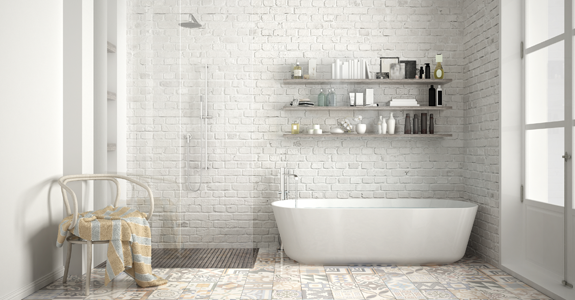Bathroom Water Damage 101


Here’s how to look for signs of water damage and stop it before it starts.
Follow your nose. Smell something musty after you shower? That’s a hint your bathroom may have water damage. Try scrubbing the shower clean first. If the musty smell remains, there might be a leak inside a wall.
Look up. If you see cracks in the paint on your ceiling or walls, or if the walls look warped, that may indicate your drywall is absorbing water.
Look down. Stains or uneven spots on your bathroom floor may signal a hidden leak; ditto for water stains around your toilet.
Beware of backups. Bathroom backups happen all the time, and they can cause significant damage. Play it safe: Don’t leave the bathroom if the toilet keeps running. Keep sink drains clear. Keep little ones away from plumbing fixtures.
Check vents and pipes. Improper ventilation in your bathroom can trap water, and faulty plumbing can cause leaks. Clean your vents and check your plumbing once a year to guard against potential problems.
Use a sensor. A water alarm or shutoff system can keep a small leak from turning into a disaster. Battery-operated sensors that set off an alarm when they detect moisture are an inexpensive option. If you travel a lot, a whole-house system with a shutoff valve at the main water supply may be a better, although pricier, way to go.
If you think your bathroom may be at risk for water damage, you’ll want to know what’s covered by your policy and what isn’t. Is a leaky toilet covered? What about a sink or tub that overflows?
The answer is an unequivocal “it depends.” It depends on the source of the damage, the type of policy you have, and whether the water damage was sudden or gradual. Insurance is designed to cover sudden or accidental damage versus damage caused by gradual wear and tear over time.
Follow these homeowner best practices:
Sources:
https://www.thebalance.com/how-to-handle-water-damage-claims-3860314
http://home.costhelper.com/water-damage.html
http://www.smartfem.com/business-finance/what-kind-of-water-damage-is-covered-by-homeowners-insurance
Click on the Find an Agent button to search for independent insurance agencies near you.
Contact the independent insurance agency you would like to work with by phone or email.
Leave it up to your agent to uncover the best coverage solutions for your valuable property.